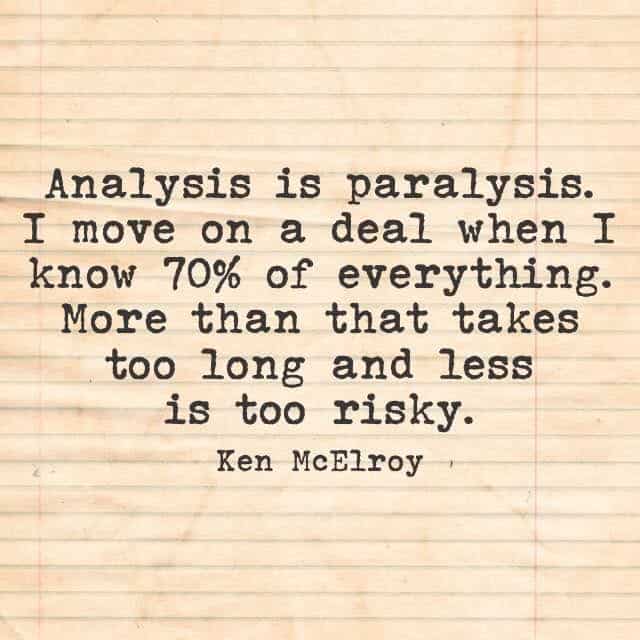
I love learning about the kinds of mistakes real estate investors are prone to make.
Why? Because when I started my real estate investing career as an accidental landlord, I made every mistake in the book.
Now that I’m more seasoned (ugh, seasoned … that makes me sound kind of old), anyway, now that I’m more experienced, I still make mistakes sometimes. For example, I’m probably too conservative in my investing style (see mistake No. 1).
So without further ado, here are 5 common real estate investing mistakes that you might be making, which can be costing you.
1. Over-Leveraging (or Under-Leveraging)
If you put down 20% on a house, you’re using 20% of your own money, and 80% is leverage.
Well, you do the same thing when you’re buying a rental property—unless you buy a property and pay 100% for it upfront… but most people don’t do that. They get funding for their investment properties through their bank, an online mortgage lender or a hard money lender.
Here’s an example of how leverage can work for you. Let’s say you buy an investment property for $200,000, and you pay in cash. After factoring in your set expenses, such as property taxes, landlord insurance, and HOA dues, you'll have cash flow of $1,000 a month, or $12,000 a year. That’s a 6% return on investment. Not bad, but not stellar either.
But what if you were to use the same $200,000 and get five properties with it? If you put down 20% on each or $40,000 per property, now your cash flow might be only $300 a month when you figure in the mortgage payment, but that’s $300 per house, making your total cash flow $1,500 a month, or $18,000 a year. That’s a 9% return on investment – quite a bit better, right?
That’s how leverage can work for you, and if cash flow is your primary concern, it’s not difficult to see how not leveraging can be a mistake.
But don’t forget, over-leveraging can be a mistake too.
Why? One word: risk.
When the average investor borrows money to buy a property, they do it with the assumption that their property will appreciate in value. And it often does. But what if it doesn’t? What if there’s a market crash? If that happens, your investment properties could suddenly depreciate in value and you might find yourself underwater (owing more than the property is worth).
Of course, if you have steady renters who continue to pay your rental price, you should be okay… but if your renters are affected by a local economic recession or want their rent lowered, you might have a problem. With a market crash, rents often decrease, sending many landlords in a downward spiral and at risk of losing their properties.
The key is to find your right balance so that you won’t lose everything in a crash and can ride it out. I do this by analyzing my budget and understanding what I can handle if bad things were to happen. I ask myself,
“What if I can't find tenants? Will I be able to make the mortgage payments until I can, and if so, for how long?”
It's more difficult, for example, to find renters in my area between September and February, so I need to time my deals correctly or be able to ride out the tough months.
“What if real estate prices decline in my area? Will I be over-leveraged to the point of being underwater? Would I then need to give up my investments through short sale or foreclosure?”
I prepare for that by buying houses in a certain price range and putting down at least 40% on a home because that is my comfort level. And I only buy in areas I know well and are likely to appreciate (or at least hold their value).
Take time to think about what you're comfortable with. The key is to find the right balance between over-leveraging and using enough leverage that works for you.
2. Not Delegating (or Delegating Poorly)
When you're starting out as a real estate investor, there's a fair case to be made for doing as much as you can yourself, because you'll be able to hold onto more of your money that way.
There are a lot of tasks involved in the day-to-day of a real estate investor.
- Identifying properties
- Crunching the numbers
- Inspecting properties
- Closing on purchases
- Repairing and maintaining each unit
- Screening tenants
- Managing tenants
- Collecting rent
- Keeping financial records
- Submitting taxes
With that said, trying to do everything on your own is probably not the best use of your time. While you probably can do many of these things yourself, at some point it only makes sense to bring on some help for some of these tasks.
I like to tell the story of my first rental property. It was on the west coast, but I had moved to the east coast. It was simply too hard to manage on my own, so I hired a property manager. That was the right move. Unfortunately, I didn’t properly screen the property manager and I ended up doing more work than they were doing. This company was so unresponsive to my tenant that my tenant actually needed to contact me to order and put in a new oven. So, please screen your property management company before hiring one. Read reviews and interview them to determine whether they would be a good fit for you.
RELATED: Finding the Right Property Management Company
The same goes for any professional you hire to help you with your real estate business, and that is how to think of real estate investing. It’s your business, so you want to hire only people you vet first.
My properties are now local to where I live, and I enjoy managing them myself. But I do outsource a housing inspector before I ever buy a property, a handyman for both preventive maintenance and repairs, and an accountant to do my taxes. I also use an online screening tool to run background and credit checks on tenants.
3. Being Suckered by Weekend Seminars
Have you heard the TV or radio ads that offer a “free real estate seminar” in your area? They often promise to teach you how you can earn real money flipping houses for little to no money down. You might be able to learn something from some real estate seminars, but many are just ploys to get you to spend real money, often thousands or tens of thousands of dollars, on more training and coaching, which usually turns out to be a huge waste of money.
The key to actually learning something from a real estate school or program is to have a great mentor, someone who is experienced in the real estate investing niche you’re interested in and knows your local area well.
Realize that there are many ways to learn about real estate investing that won’t require you to spend thousands or tens of thousands of dollars. You have many resources online (such as this one!) or books from Amazon that go in-depth on many different specialties of real estate investing.
4. Being Overly Cautious (or Not Cautious Enough)
Most new real estate investors start out with a lot of excitement. It’s not unusual for a beginner to fall in love with a house and want to buy. The problem is – they’re thinking emotionally and this is not how successful investors make decisions. If you find yourself feeling really excited about your first purchase, just stop. Take a deep breath. Analyze the deal and run the numbers. Get all the facts, verify those facts and make sure the investment actually makes sense.
Have you accounted for all the expenses (property taxes, insurance, mortgage payments, maintenance reserves, property management and the like)? Do you have an accurate idea of how much rent the property is likely to generate (and have you verified these numbers with a local property manager to make sure it’s an accurate estimate)?
Note: It’s better that you don’t buy an investment property with the sole idea that it will appreciate in value. Why? Because real estate doesn’t always appreciate. If it does appreciate, consider that a bonus, but not the sole reason to invest in it.

Thinking things through is good, but overthinking and never acting is not. Once you have analyzed a deal, you’ve verified the numbers with a third party and the numbers work, you should probably go for it. Real estate is a great way to build wealth.
5. Buying in the Wrong Neighborhood
You probably know that location in real estate is huge. You need to buy in places where people want to be, and this is especially true for an investment property.
Where do people want to be? Probably the same kinds of places where you’d want to be: where there are jobs, good schools, and things to do. So it’s important to buy in an area that is either thriving economically now or, even better, is up-and-coming (that’s where the real deals can be). You want people to be able to afford the rent, however, so getting a “great deal” in an economically depressed area might not turn out to be so great.
Note that you can probably get a better deal on a property that is further out from the city center, but there will be less demand the further out you go. But trying for that prime spot in midtown might not be the best choice either if the cost is sky-high. So study the neighborhood to see if it has the important features you think people will want, and run the numbers before you buy.
As you can see, most of these mistakes are only mistakes if you fall on one end of the spectrum or the other. The good news is that there are remedies for all of them. Now that you know some of the top real estate investing mistakes, you are better prepared to get in the game and to start making money in real estate investing.



















